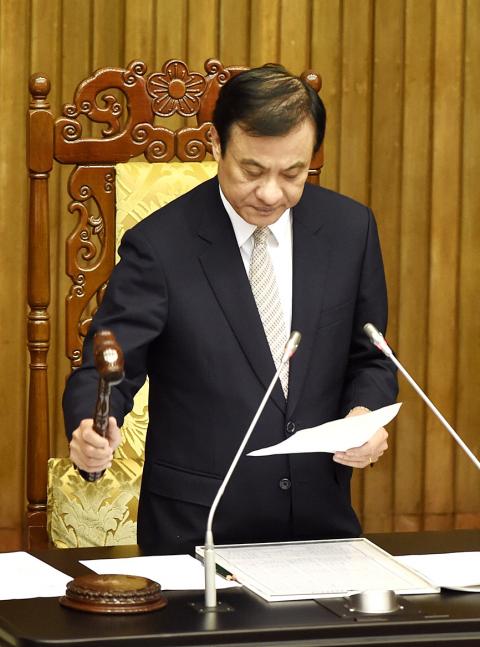The Legislative Yuan yesterday passed the Act for Uncrewed Vehicle Technology Innovations and Experiments (無人載具創新實驗條例), which exempts developers from certain legal restrictions when testing uncrewed vehicles for a prescribed period of time.
The act defines uncrewed vehicles as land vehicles, aircraft and ships — or any combination thereof — that are remotely controlled or capable of autonomous operations by surveying their surroundings, determining their position and determining the best route.
The law is based on the concept of a regulatory sandbox first incorporated in the Financial Technology Development and Innovative Experimentation Act (金融科技發展創新實驗條例), which was passed in December last year and allows financial technology firms to completely or partially bypass financial regulations when testing innovative financial services, said the Ministry of Economic Affairs, which governs autonomous vehicles.

Photo: Chien Jung-fong, Taipei Times
The act allows successful applicants to circumvent a plethora of mostly traffic laws when field testing uncrewed vehicles at locations designated by the ministry. These include items in the Road Traffic Management and Penalty Act (道路交通管理處罰條例), the Highway Act (公路法), the Civil Aviation Act (民用航空法) and the Ships Act (船舶法).
Monitoring staff should have full control over any uncrewed vehicle by way of unobstructed two-way communications using an automated system, the act stipulates.
In the event that applicants need to set up, manufacture or import telecommunications devices to test uncrewed vehicles, they can expedite the process by notifying the National Communications Commission without having to pass a review, the act says.
However, no uncrewed vehicle tests or experiments shall breach the Money Laundering Control Act (洗錢防制法) or the Counter-Terrorism Financing Act (資恐防制法), and applicants must shoulder any legal liabilities under the Civil Code or the Criminal Code as a result of their tests, it says.
Tests or experiments with uncrewed vehicles should not exceed one year and can be extended once by no more than a year after obtaining approval from the ministry, the act says.
The ministry should publish an overview of approved projects that includes their permitted scope, their time frame and the laws they are exempted from on its Web site and must inspect the testing location if necessary, it says.
It must order an applicant to make the necessary improvements should any test or experiment exceed the approved scope, affect public transportation, pollute the environment, threaten participants’ safety, or compromise national or social security, and it can terminate a project if an applicant fails to comply within a prescribed period.
Should an accident occur during testing, the applicant should immediately stop tests, inform the ministry and issue any necessary compensation to those affected, the act says, adding that testing should only resume after adequate measures are adopted to ensure safety.
Democratic Progressive Party caucus whip Ker Chien-ming (柯建銘) said that the act makes Taiwan the first nation to create a regulatory sandbox to aid research and development of uncrewed vehicles.

ANOTHER EMERGES: The CWA yesterday said this year’s fourth storm of the typhoon season had formed in the South China Sea, but was not expected to affect Taiwan Tropical Storm Gaemi has intensified slightly as it heads toward Taiwan, where it is expected to affect the country in the coming days, the Central Weather Administration (CWA) said yesterday. As of 8am yesterday, the 120km-radius storm was 800km southeast of Oluanpi (鵝鑾鼻), Taiwan’s southernmost tip, moving at 9kph northwest, the agency said. A sea warning for Gaemi could be issued tonight at the earliest, it said, adding that the storm is projected to be closest to Taiwan on Wednesday or Thursday. Gaemi’s potential effect on Taiwan remains unclear, as that would depend on its direction, radius and intensity, forecasters said. Former Weather Forecast

As COVID-19 cases in Japan have been increasing for 10 consecutive weeks, people should get vaccinated before visiting the nation, the Centers for Disease Control (CDC) said. The centers reported 773 hospitalizations and 124 deaths related to COVID-19 in Taiwan last week. CDC Epidemic Intelligence Center Director Guo Hung-wei (郭宏偉) on Tuesday said the number of weekly COVID-19 cases reported in Japan has been increasing since mid-May and surpassed 55,000 cases from July 8 to July 14. The average number of COVID-19 patients at Japan’s healthcare facilities that week was also 1.39 times that of the week before and KP.3 is the dominant

The Chinese Communist Party’s (CCP) working group for Taiwan-related policies is likely to be upgraded to a committee-level body, a report commissioned by the Mainland Affairs Council (MAC) said. As Chinese President Xi Jinping (習近平) is increasingly likely to upgrade the CCP’s Central Leading Group for Taiwan Affairs, Taiwanese authorities should prepare by researching Xi and the CCP, the report said. At the third plenary session of the 20th Central Committee of the CCP, which ended on Thursday last week, the party set a target of 2029 for the completion of some tasks, meaning that Xi is likely preparing to

US-CHINA TRADE DISPUTE: Despite Beijing’s offer of preferential treatment, the lure of China has dimmed as Taiwanese and international investors move out Japan and the US have become the favored destinations for Taiwanese graduates as China’s attraction has waned over the years, the Ministry of Labor said. According to the ministry’s latest income and employment advisory published this month, 3,215 Taiwanese university graduates from the class of 2020 went to Japan, surpassing for the first time the 2,881 graduates who went to China. A total of 2,300 graduates from the class of 2021 went to the US, compared with the 2,262 who went to China, the document showed. The trend continued for the class of 2023, of whom 1,460 went to Japan, 1,334 went to